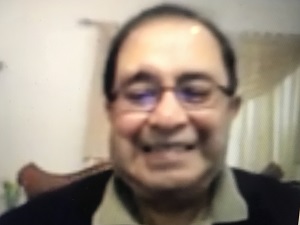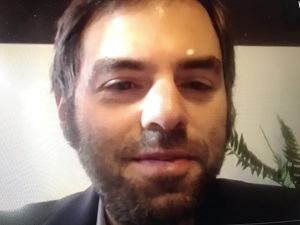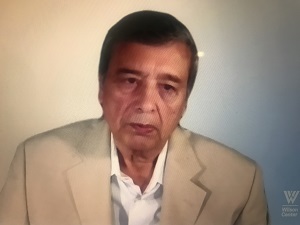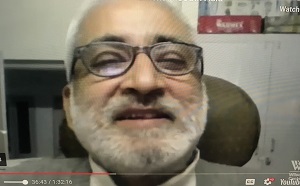Dr Sandeep Pandey on Nuclear Weapons, Peace, and Kashmir
By Elaine Pasquini

Washington: On November 17, the Wilson Center’s Asia Program, together with South Asia Democracy Watch, hosted Dr Sandeep Pandey to present the 2022 Asma Jahangir Memorial Lecture, a series honoring the late Pakistani leading human rights activist Asma Jahangir, who passed away in 2018.

Aftab Siddiqui |

Michael Kugelman |

Qaisar Abbas
|

Sandeep Pandey |
Pandey, an Indian scholar and democracy and human rights activist who holds a PhD from the University of California at Berkeley, began with remarks on nuclear weapons and disarmament.
Preventing the use of nuclear weapons was a priority for the United Nations upon its creation, he said. After the Cold War ended and the US and Soviets talked about reducing their stockpiles of nuclear weapons, Russian President Mikhail Gorbachev and US President Ronald Reagan both said a nuclear war cannot be won and must never be fought. “Their engagement shows weapons stockpiles can be reduced if not eliminated completely,” he pointed out.
In the context of Russia’s war on Ukraine, the leaders of the recent G20 meeting in Bali issued a statement that “the use or threat of use of nuclear weapons is inadmissible,” Pandey noted.
Of the ten countries that possess nuclear weapons, five are the permanent United Nations Security Council members: France, Russia, China, the United States and the United Kingdom. The other five are Pakistan, India, Israel, North Korea and Iran. According to the US intelligence community, Iran has the capacity to produce nuclear weapons but presently has not mastered the necessary technologies to build them.
According to him, more than 100 countries have voluntarily entered into treaties to commit themselves to not possessing nuclear weapons. These countries, Pandey said, include all of Latin America, the Caribbean, countries in the South Pacific, all African countries, five Central Asian countries and Mongolia.
“This gives us hope that the majority of the world is sane and knows that it is dangerous to possess nuclear weapons,” Pandey said. “My argument is if we have not used these weapons in any wars since 1945…why keep them? These are countries which understand that logic very well. We need to think like countries in nuclear weapon-free zones…and for that we need wiser leaders.”
Ironically, Ukraine gave up its nuclear weapons after the USSR was dismantled and “had Ukraine kept its nuclear weapons probably Russia would not have been able to attack Ukraine in this manner,” he noted, adding that the most common reason for having nuclear weapons is for deterrence.
Pandey questioned why Indian Prime Minister Narendra Modi has urged Putin to talk to Ukraine about limiting nuclear weapons but hasn’t spoken on the issue with Islamabad.
Easing border restrictions for both tourism and trade would be an important confidence-building measure, Pandey said. Presently, most trade between India and Pakistan goes through a third country, but direct trade “would reduce if not end completely the feeling of animosity between the governments.”
From his many visits to Pakistan, Pandey feels that the average people want peace and would like the borders to open up. Emphasizing the common culture, food and language between the two countries, he said: “If people are allowed to meet, there is a great possibility that disputes can be resolved. Whatever division is only political.”
The only positive development in recent times, he recalled, was the opening in 2019 of the Kartarpur Sahib corridor, a Sikh religious site inside Pakistan five km from the Indian border, which allowed Sikhs from India to visit without a visa. Pandey suggested, without success, that India reciprocate and allow the same access for Pakistanis to visit the Ajmer Sharif shrine in India.
Turning to other subjects, moderator Michael Kugelman, director of the Wilson Center’s South Asia Institute, fielded wide-ranging questions from Qaisar Abbas and Aftab Siddiqui of South Asia Democracy Watch, as well as ones from the virtual audience.
Answering Siddiqui’s question on whether India had a military-industrial-complex, Pandey stated: “There is a lobby which stands in the way of friendship and peace between Pakistan and India.”
Regarding India’s relationship with China, Pandey said even though there have been clashes he believes China will never attack India because the size of the Indian market is too large. “I think economics is what dominates global politics more than the idea of capturing territory or colonialism.”
Qaisar Abbas posited the biggest obstacle to achieving peace between India and Pakistan is Kashmir and asked about any possible back-channel negotiations between the two countries.
Pandey responded he was unaware of any current talks between India and Pakistan, noting “this [Indian] government…doesn’t think that Pakistan is a party to any solution to Kashmir.” But under the present [Indian] regime there is no [local] government in Kashmir since India revoked Article 370 of its constitution in 2019 which gave special status to Kashmir.
“The last time we came close to a solution on Kashmir was under Prime Minister Manmohan Singh when he clearly said he would make Kashmir borderless and there was some talk of allowing complete freedom to Kashmiris to travel between the Indian-controlled area and the part under Pakistani control,” he explained. “But I guess, again, we have to wait for more saner leadership before we can reach that kind of solution.”
Pandey believes there is hope for peace through the youth in both India and Pakistan. “Youth are the future; they will lead the process of friendship and peace between the two countries,” he averred.
Wrapping-up, Pandey stated that hate, animosity or any negative feelings between India and Pakistan are not permanent. “What is permanent is positive feelings – feelings of friendship and love and brotherhood – and that is what I think will ultimately survive.”
(Elaine Pasquini is a freelance journalist. Her reports appear in the Washington Report on Middle East Affairs and Nuze.Ink.)

